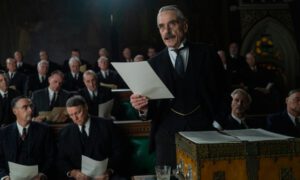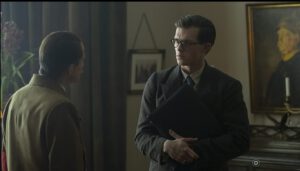Movie Info
Movie Info
- Director
- Christian Schwocho
- Run Time
- 2 hours and 10 minutes
- Rating
- PG-13
VP Content Ratings
- Violence
- 2/10
- Language
- 1/10
- Sex & Nudity
- 1/10
- Star Rating
Relevant Quotes
How beautiful upon the mountains
are the feet of the messenger who announces peace,
who brings good news,
who announces salvation,
who says to Zion, “Your God reigns.”
They have treated the wound of my people carelessly,
saying, “Peace, peace,”
when there is no peace…
We look for peace, but find no good,
for a time of healing, but there is terror instead.

In Christian Schwochow’s “what if?” movie fact and fiction are mixed together in a compelling way. Based on the bestseller by Robert Harris, the film transports us to the halls of Whitehall and Munich in 1938 when Europe stood on the precipice of war. Two classmates from Oxford, the British Hugh Legat (George MacKay) and the German Paul von Hartmann (Jannis Niewöhner) are aspiring members of their governments who are destined to come together again at the historic peace conference between British Prime Minister Neville Chamberlain (Jeremy Irons) and German Führer Adolph Hitler (Ulrich Matthes).
In a flashback to 1932 we see the two friends at a wild fireworks party drinking too much champagne out on the lawn with Paul’s Jewish German girlfriend Lena (Liv Lisa Fries). At that time Paul held high hopes for the future of Germany because of the new leader who was about to come to power. He brushes off the anti-Semite charges against Hitler, certain that this was something minor, given his many leadership qualities. This drives a wedge between the German and the Brit that will not be set aside until years later.
Now it is 1938, and something has happened that has turned Paul against the Führer. He has joined with others, including some high-ranking Nazi officers and Helen Winter (Sandra Hüller), who is his now his girlfriend and a part of the foreign service with access to sensitive documents.

In England Hugh is a husband who has distanced himself from his wife and child, perhaps because of the increasing demands of his job as secretary to Prime Minister Chamberlain. Though the young man is told by superiors to keep quiet around the PM, Chamberlain takes a liking to him and occasionally opens up to the younger man, sharing his deep desire to avoid another tremendous blood-letting like that of the Great War. The PM hopes that Italian dictator Mussolini can help block Hitler’s, but when this does not work out, agrees to meet with Hitler and yield to his take-over of the German population section of Czechoslovakia on the basis that Hitler will stop there.

In Germany Helen has stolen a document approved by all the Nazi hierarchy that reveals that Hitler’s moving into the Sudetenland is but the first step in his master plan to conquer all of Europe. He has met Hitler, and it is arranged for him to be part of the entourage that goes to Munich. British Intelligence are contacted, and its agents convince Hugh to take on the dangerous job of meeting with his old friend to receive the document. Thus, amidst all the diplomatic scenes—and these are wonderfully staged—are the cloak and dagger scenes of the two old university chums hooking up without the Gestapo observing them, and then Hugh trying to get Chamberlain to see and read the document before he signs the agreement with Hitler.
We know the outcome of Munich, so the only real suspenseful plot point is whether a boyhood friend of Paul, Franz Sauer (August Diehl), will uncover what he is up to. Sauer, one of the Führer’s bodyguards acts friendly when he sees his old friend again, but he harbors a deep suspicion concerning him. During this brief reuniting of Hugh and Paul we also learn why the latter has now become such a fierce opponent to Hitler that he is willing to participate in a plot to assassinate the dictator. It is connected with the third member of their trio at Oxford, Lenya, whose fate Paul reveals first-hand to his former friend.
The film’s two main characters are fictional, and yet one of them, Paul, is based loosely on an actual German conspirator, Adam von Trott zu Solz, a person who was involved in the famous July 20 1944* plot to assassinate Hitler. He was arrested and executed as a result. (Indeed, there were over 20 plots to topple Hitler, beginning in the 1920s and extending throughout dictator’s reign. They involved military leaders and civilians, probably the best one known to VP readers being Dietrich Bonhoeffer, theologian and teacher.)
I found the film fascinating, the costumes and streets teeming with vintage cars and the buildings of Munich festooned with Nazi flags recreating the look of the period. The interchanges between PM Chamberlain and Hugh are interesting in that they seem to be inspired by an attempt at revisionist history, to change Chamberlain’s reputation as a weak appeaser who totally misjudged Hitler. Jeremy Irons as the PM, passionately agonizing over the slaughter on the Continent a generation earlier, is perhaps the best reason for seeing this film. It is true that the generals and admirals told Chamberlain that they could not win a war against a Germany allied with Italy and Japan, so the movie’s end notes might be right that the peace treaty bought Great Britain a year’s time to rearm so that the nation could stand against the Blitz when war broke out in 1939.
I doubt that one film will make much of an improvement of our judgment of Neville Chamberlain’s reputation, but at least we might see him as a man sincerely seeking peace in his time. As we see in the film, Chamberlain returned home to the acclamation of the public and of Parliament, very much like Isaiah had written, “How beautiful upon the mountains/ are the feet of the messenger who announces peace.” But it did not take long for Hitler to show his true colors, so, instead, was Chamberlain like those in the prophet Jeremiah’s time who prophesized a phony peace? Jesus had promised that peacemakers would be called “children of God,” but the hapless Prime Minister soon was called the weak appeaser.
This is another film that I believe would have made a better limited series so as Lenya’s story, which contributed greatly to Paul’s conversion from Hitler fanatic to freedom fighter, could have been shown in more detail. Also, Hugh’s relationship to his family, which seems stuck in without much relevance to the plot, could have been related more fully.
Despite the above, this is a film worth your time. In a climactic scene we are faced with the ethical dilemma of politics and murder. Is it right to kill one man in order to save the lives of millions of others? We face this question with Hitler from the benefit of hindsight, but not so Paul as he fingered the gun hidden behind his back. It is a question that theologians and ethicists like Bonhoeffer wrestled with, the latter so drawn to the great Apostle of Nonviolence that he would have traveled to India to meet the Mahatma had not the War intervened. After agonizing over this question, Bonhoeffer gave up his pacifism, deciding that he could NOT stand by and do nothing, so he joined his fellow Germans in their assassination desperate plot. That word might be longer and more difficult to spell, but it is still murder. The conspirators had even worked out a plan for contacting the Allies and for reviving their nation after the War. So, were they patriots or murderers? This film leaves us deciding whether Paul, given his great opportunity was a man of ethics or a moral coward. What would you have done in Paul’s place?
*See the 2008 docudrama starring Tom Cruise, Valkyrie, for details on this last attempt to remove Hitler.
This review will be in the February issue of VP along with a set of questions for reflection and/or discussion. If you have found reviews on this site helpful, please consider purchasing a subscription or individual issue in The Store.
